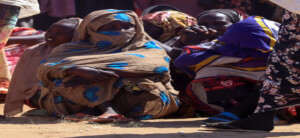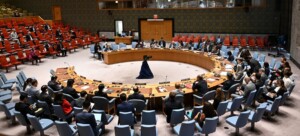Women’s vigil in Darfur commemorates massacres
Women carried out a vigil in front of El Geneina court in West Darfur yesterday, in solidarity with the victims of the 2004 massacres in Mukjar and Bindisi.
 Women commemorating the Mukjar massacre in 2004 in El Geneina, West Darfur, yesterday (RD)
Women commemorating the Mukjar massacre in 2004 in El Geneina, West Darfur, yesterday (RD)
Women carried out a vigil in front of El Geneina court in West Darfur yesterday, in solidarity with the victims of the 2004 massacres in Mukjar and Bindisi.
The massacres have allegedly been carried out by Ali Abdelrahman (also known as Ali Kushayb), who is currently held by the International Criminal Court (ICC) in The Hague. He has been accused of war crimes and crimes against humanity in Darfur.
The 2007 ICC arrest warrant against Abdelrahman mentions the massacres in Mukjar and Bindisi localities no less than 36 times. “Considering that there are reasonable grounds to believe that as one of the leaders of the Militia/Janjaweed, which acted together with the Sudanese Armed Forces, Ali Kushayb personally participated in some of the attacks against civilians, namely on the towns of Kodoom, Bindisi, Mukjar and Arawala between August 2003 and March 2004, where killings of civilians, rapes, torture and other cruel treatments, pillaging of towns and destruction of properties of the civilian population occurred, and that therefore he committed, jointly with others, the alleged crimes.”
In the arrest warrant, the ICC states that the violent events in Mukjar and surrounding areas “constitute a crime against humanity” and “a war crime”.
Last week, over 25,000 people commemorated the 2004 massacre in Mukjar.

The West Darfur Network for the Protection of Displaced Women and civil society organisations working in the field of motherhood and childhood participated in yesterday’s solidarity vigil.
Several leading members of these organisations addressed the demonstrators.
The head of the Network for the Protection of Displaced Women, Maryam Hussein, stated that all those who committed crimes against humanity and war crimes in Darfur must be handed over to the ICC.
She said that Abdelrahman's trial marks the beginning of the trials of those who masterminded the genocide and ethnic cleansing in Darfur, including rape, humiliation and displacement of women.
Women’s rights
Alawiya Mukhtar, working for one of the civil society organisations, demanded that women's rights are to be guaranteed in accordance with international covenants and the Sudanese law. She said that the Constitutional Declaration, that was signed in August last year by the then ruling Transitional Military Council and the opposition Forces for Freedom and Change, guarantees women in conflict areas not only the right to protection, but also the right to participate in power as a genuine and active partner in peacebuilding, decision-making and democratisation.
She claimed that women were guaranteed 40 per cent of all positions. She demanded that women will be included in peacebuilding and the establishment of monitoring, implementation and accountability mechanisms during the current transitional period.
Mukhtar expressed her concern about the fate of women during tribal fighting and violence in Darfur between 2003 and 2019. She said the camps for the displaced are overcrowded with women and children in dire conditions.
She demanded urgent support to local projects and initiatives that trigger dialogue between different groups at grassroots level, in order to achieve peacebuilding, peaceful coexistence, reconciliations and social fabric.
Women in Darfur have demanded more power in general, and participation at the Juba peace talks between the Sudanese government and the armed rebel movements in particular, before.
*At his first appearance before the ICC on June 15, Ali Kushayb (as stated on the arrest warrants) insisted that he be referred to as Ali Abdelrahman. The judge provisionally ruled that the suspect will be referred to as such.

Radio Dabanga’s editorial independence means that we can continue to provide factual updates about political developments to Sudanese and international actors, educate people about how to avoid outbreaks of infectious diseases, and provide a window to the world for those in all corners of Sudan. Support Radio Dabanga for as little as €2.50, the equivalent of a cup of coffee.












 and then
and then